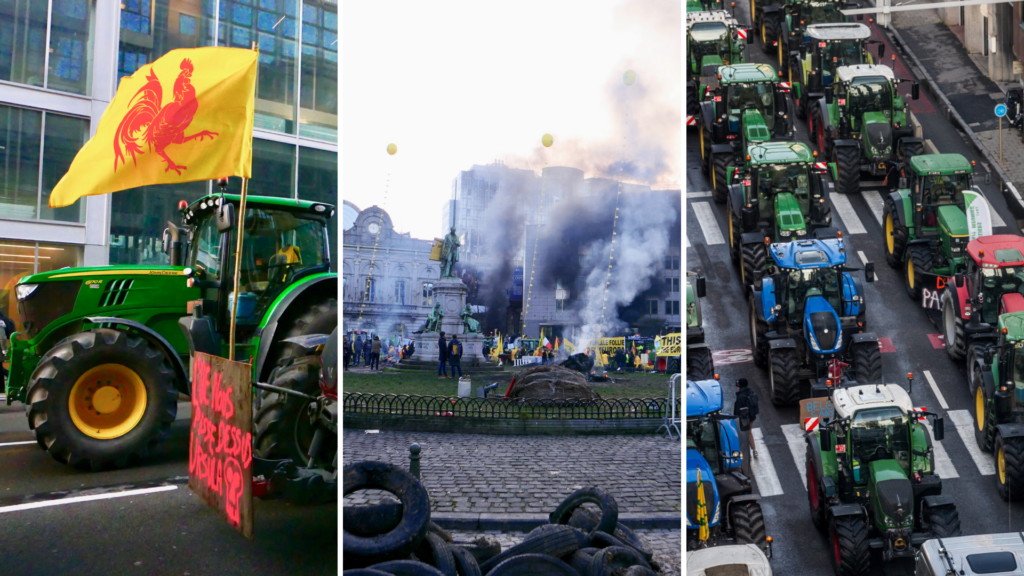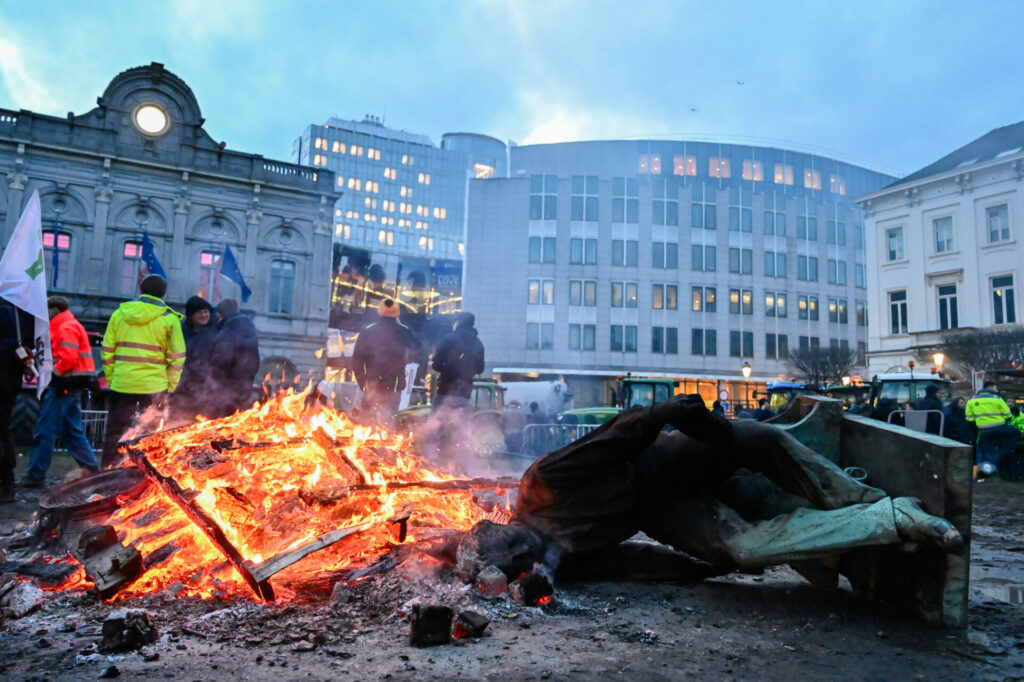Already making their mark in protests across Belgium and beyond, today farmers focussed the four-wheeled force of their frustration on Brussels as EU leaders held emergency talks on aid for Ukraine.
Now approaching two years since Russia's invasion, heads of state were intent on bringing Hungary to heel in supporting the €50 billion support package. But outside the Hemicycle another struggle was dominating the airwaves as over 1,000 tractors gridlocked the European Quarter and farmers from across Europe came together to impress their plight on legislators.
It's not the first time a convoy of heavy machinery has pitched up on "Plux" in front of the European Parliament and each time it's a compelling display of defamiliarisation, demanding an appraisal of how we typically picture a sector taking their fight to the doorstep of legislators. To add to the spectacle, barricades of tyres and burning bales of hay gave an anarchistic air to the place.
But as union representatives made speeches, the general mood was to express grievances through words rather than aggression. Those farmers I spoke to – Belgians, French and Italians – were hesitant to pin too much hope to what was by any account a remarkable turnout. Though many commented on the camaraderie as meals were shared on open fires and bottles passed around, expectations were tempered with resignation. Better to be heard than suffer in silence, was the common refrain.
As discussed yesterday, attributing responsibility for the hardships that farmers face is hugely complex. This week's demonstrations set the sights on EU institutions but others have apportioned blame to national governments. One farmer explained to me that regional authorities use drones to check if land is being used correctly.
We might also ask whether consumers are free of guilt; when it comes to putting money where mouths are, do we not have the final say? It's a grey area but many producers I talked to this morning expressed a wish that people would also be more mindful of where their food comes from.
In particular, they called out the profits enjoyed by major distributors and multinationals that transform basic ingredients into supermarket products. The gap between what is paid to farmers and retail prices can be huge and grows for every step of transformation. One grain producer from Liège explained that his revenue is tied to the international price of grain. Prices are typically fixed ahead of harvesting and there's no option to hunt for a better deal.
Besides, who has time to look around for another buyer, after the long hours working the land and the weight of administration to be completed as well?
Whilst today's protest was a show of unity, the challenges for farmers vary hugely, not only between countries and regions but the activity itself. What works for a Flemish milk farmer means little to a Sicilian tomato grower. Just as the distance from field to plate can be great, so too the gap between EU law and its effect on the ground.
Meanwhile crops must be tended and livestock fed. What will be achieved after the tractors have left town? Let @Orlando_tbt know.
Belgium in Brief is a free daily roundup of the top stories to get you through your coffee break conversations. To receive it straight to your inbox every day, sign up below:
1. Pricey train tickets and fewer e-scooters: What changes in Belgium on 1 February?
It doesn't seem all that long ago since the long list of changes was introduced on 1 January, but the start of a new month has already arrived. In February, fewer new rules will come into force in Belgium, but they are no less impactful. Read more.
2. Farmers occupy the streets of Brussels' European Quarter (photos)
Some 1,300 tractors have gathered in the streets around the European Parliament in Brussels, as farmers are expressing their dissatisfaction with their declining incomes and increasing. The atmosphere briefly turned grim, but the protest is overall happening peacefully. Read more.
3. Immigration Office told to stop revoking Belgian nationality from Palestinian children
The Federal Ombudsman has asked Belgium's Immigration Office to immediately stop instructing municipalities to remove the nationality of children born in Belgium from Palestinian parents. Read more.
4. Some 1,200 tractors in Brussels, EU Quarter closed off to traffic
The sounds of honking tractors have been heard since Wednesday night across Brussels and the European Quarter. More than 1,000 tractors have gathered in protest, causing traffic disruption around Place du Luxembourg. Read more.
5. EU agrees on €50 billion in aid for Ukraine
The European Council has voted unanimously to provide a further €50 billion in aid for Ukraine – this time avoiding a veto from Hungarian Prime Minister Viktor Orbán. Read more.
6. Several Brussels vegan spots crowned best in Belgium
The food and drinks scene in the Belgian capital is becoming increasingly vegan-friendly. But four Brussels establishments in particular made a significant impact on the Belgian vegan offering, picking up prizes at the Belgian Vegan Awards. Read more.
7. On a wing and a prayer: The Belgian wartime hero who broke the Nazi defence
Baron Jean de Selys Longchamps pulled off one of the most audacious, unauthorised flying feats of World War II to earn his place in the pantheon of Belgian legends. Read more.


